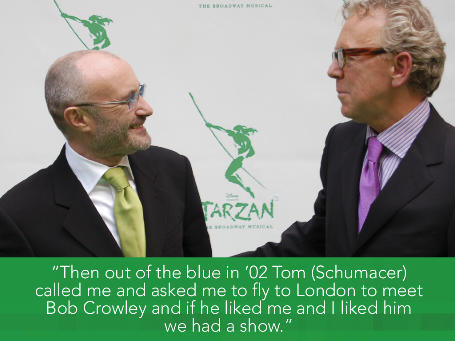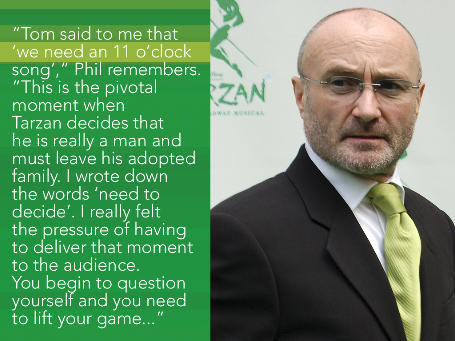Talking Tarzan with Phil Collins
Page 2 of 4
Although still racked with reservations Phil invited Zippel to his home studio to work on the Tarzan songs. However the collaboration was not productive for Phil as he felt he was producing material that wasn’t typical of his work. “I still accepted the role and I was told to do nothing,�? Phil says. “I spent two weeks working on my own in the studio spit-balling tunes as I wanted to be ahead of the game. I knew the ‘Greatest Hits’ of the story but had not read the book so the Studios sent me a copy which I read and annotated throughout thinking ‘they are bound to use this and that’. I then wrote and recorded some songs and I’d say about ninety percent of them have ended up in the movie or musical. It was a really productive two weeks for me.�?
After receiving the tape Chris Montan flew back to Europe with the first treatment of the script to brain-storm ideas with Phil. “The treatment was only three or four pages but Chris pointed out where they were thinking of having a song,�? Phil recollects. “I had nothing to look at so had to rely on instinct the whole time. I didn’t even use computers at the time so had to keep re-recording the whole song every time there was a revision as I couldn’t edit the piece at all. I finally got one for Brother Bear as Chris said the process would kill me if I had to do it again! However the Tarzan team really fell in love with the way I was writing the music.�?
Tom Schumacher has insisted to me on several occasions that Walt Disney Feature Animation (WDFA) had always planned for Phil Collins to sing all of the songs in the movie but Phil says that this was never communicated to him: “I had assumed that I was writing for character like all of the movies since The Little Mermaid but it seems that the creative team had the strength to change the way they did things for Tarzan by adding a narrator. They didn’t like the idea of Tarzan singing anyhow.�?

At the London premiere of Tarzan WDFA President Tom Schumacher pitched the idea of Brother Bear to Phil but weeks before Tom had begun to sound out another project to Phil. “Between Tarzan opening in the United States and Europe we automatically said that we should take the movie onto the stage,�? Phil calls to mind. “The Lion King had recently opened on Broadway and proved that you could interpret animated movies in a three-dimensional way. However the bad news for us was the need to discover a way to represent the animal world in Tarzan differently as a musical. No-one had any idea so we put the suggestion on the backburner. Then out of the blue in ’02 Tom called me and asked me to fly to London to meet Bob Crowley and if he liked me and I liked him we had a show.�?

For Phil it was a never a question of whether he had the credentials to write melody for musical theater. “I began my career as the Artful Dodger in Oliver! in ’64 and I always felt that theater ran parallel with everything I did despite the fact that, like everyone else, I was listening to The Beatles, John Coltrane and even Motown at the same time,�? Phil says. “Broadway doesn’t feel alien to me and I feel well-versed in shows as I have the likes of West Side Story, My Fair Lady and even Wicked in my listening dictionary. I knew the kind of thing that works in theater by watching other shows. The only thing was that I didn’t know the psychology behind it.�?
An example of the theatrical approach that Phil has learnt over the past four years is evident in the history of the ballad Everything That I Am that anchors the second act. “Tom said to me that ‘we need an 11 o’clock song’,�? Phil remembers. “This is the pivotal moment when Tarzan decides that he is really a man and must leave his adopted family. I wrote down the words ‘need to decide’. I really felt the pressure of having to deliver that moment to the audience. You begin to question yourself and you need to lift your game. That song was originally called I Need to Decide.�?
Tarzan directors Kevin Lima and Chris Buck hit many hurdles developing the lead characters for their movie over the course of production but none more than Kerchak the patriarch silverback of the troop. Supervising animator Bruce W. Smith saw his creation on the editing room floor with each new cut of the movie as every time he opened his mouth he became more despicable as a character. “Kerchak is so miserable throughout the movie that the audience starts questioning why Kala stays with him,�? Phil acknowledges. “She is a good-looking gorilla she could find someone else! Joking aside it was going to be impossible to make Kerchak likeable as he is going to dump the kid [Tarzan]. As the male of the group he knows what is going to happen when Tarzan grows up and doesn’t want to risk the safety of his family. So we tried to get the audience to understand his motives so I took the music from a song I had written for Kala and altered it to explain why he had to do what he had to do. That became No Other Way in Act I.�?
“However Kerchak still wasn’t likeable at all even with that song. You keep questioning why Kala sticks by him,�? Phil concedes. “We needed another song to help us see beyond his actions. I had been told that other musicals had done similar things. Someone pointed out that Fiddler on the Roof has a number called Do You Love Me? which I’m told is about the old couple who have gone through life raising their family but never really looked at one another and questioned why they are still together. I have seen Hairspray though which had an excellent song where the two leads are just standing in front of the curtain with no staging at all and expressing their love for each other. I knew we needed that type of moment and in the last few months of the rehearsals I wrote Sure As Sun Turns to Moon. As I had written it in my hotel room it was unformed so it actually fell to the performers to do more. Shuler [Hensley, Kerchak] and Merle [Dandridge, Kala] really add an emotional interpretation to the song that is amazing.�?
In fact it was the character of Terk that became the Kerchak of the musical production. “We had to work hard to avoid the Nathan Lane comparison as it seems the bigger the hit, the more cliched the side-kick becomes,�? Phil recognizes. “Although Rosie [O’Donnell] said that her version of Terk was a different take on the side-kick by being female many people were not aware that the character wasn’t male because although she has a crush on Tarzan she is also a tomboy figure. We wanted to avoid all of that and so we tried to write Terk as a new character for the musical.�?
